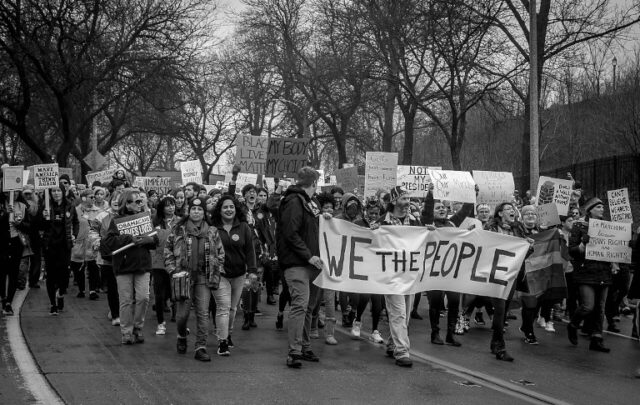WHAT IF THERE WERE A WAY TO RAPIDLY EVOLVE THE FUNCTIONING OF OUR DEMOCRACIES, PRECISELY NOW, WHEN WE URGENTLY NEED TO FACE CHALLENGES THAT AFFECT THE WHOLE CIVILIZATION?
We live in times in which political parties are hardly respected. We have got into a competition of supporting “the-less-bad” to avoid the “worse” which also ends up generating irreconcilable positions, and rather than helping to build communities and dialogue, what the party structures are doing is usually the opposite; at a time when great agreements are needed for great transformations that can no longer wait any longer.
If this were not enough,
Without a doubt, the time has come to look for alternatives: here are two that are already in place.
On the one hand we have the French model of Citizen Assembly. The country that revolutionized politics 250 years ago has done it again, and once more, a bit forced by circumstances and by civil society. A tax hike wrongly called “green” – if they are not redistributive, they are not green, they belong to the elite–, provoked discontent and ended up leading to a revolt that had an international echo, that of the Yellow Vests (Gilets Jaunes) against President Macron. He was forced to react and convened the so-called Citizens’ Climate Convention.
He must have thought, if you don’t like my measures, let’s see what you come up with. The result has been very interesting: 150 people chosen by lot, representing the diversity of the French population, took 149 measures after being advised by climate experts and after a face-to-face process of deliberation. Of those measures only a few have been implemented without change, in breach of Macron’s own promise to implement them “without filter”. Which proves two things: one, ordinary people propose much more ambitious measures than political parties, and two, traditional political parties are a barrier even when they promise to step aside.
All this has at least started a process whereby many countries around the world are implementing similar assemblies, and thus stimulating media debate on the most crucial issue of our generation: how do we make the transition to change the energy model so as not to completely burden climate stability and biodiversity? Our civilization is far more dependent on these two crucial factors than is generally understood.
Even so, we must be fair, the process is not perfect for one simple reason: we live in times of infoxication, fake news and hoaxes. Switzerland, for example, recently rejected the new Climate Law in a popular referendum. And it has done so in large part because of the media campaigns carried out by the great economic powers that -oh, surprise-, control the big media.
Perhaps there is another path to regain at the same time as a certain political control; a certain control over the media.
Continuous misinformation cannot be legal. Otherwise we expose ourselves to the risk that proposals and reforms will continue to be launched which, however well informed and well advised the representatives elected by lottery may be, will not be accepted later by society itself -as they erroneously perceive that they play against them because of the previous brainwashing. When, undoubtedly, there is nothing more against the people than to continue with this system as if nothing happened.
A few days ago, the French Press Association (AFP) exclusively released a draft of what will be the sixth report of the IPCC – the scientific institution in charge of assessing the state of ecosystems and climate change – and the conclusions are terrifying. Textually, it speaks of the fact that we have already lost control. That is, whatever we do, it is likely that we will no longer be able to avoid an escalation towards what the leading experts have called Hothouse Earth -a scenario in which the warming already unleashed will uncover feedback processes-, which will lead us to a situation in which “humanity cannot overcome what is coming”, end of quote. And just a reminder, the IPCC, as it works by consensus among multiple voices, tends to err on the side of conservatism, which is why successive reports have always been corrected for the worse.
However, this does not mean that all is lost, on the contrary, it means that it is more urgent than ever to start reacting and fast.
The second alternative that is widening the boundaries of democracy is even more transformative, which does not exclude participatory processes such as the Citizens’ Assembly, on the contrary, it is nourished by them. After a process of revolt in the streets -it is becoming clear that without them we do not move- a small democratic revolution is taking place in Chile.
In the constituent elections of June there has been a major surprise: the old parties have suffered a historic defeat and the winners have been mainly independent candidacies, among which women stand out. And all this, after the people having suffered the army in the streets and saw how the official candidacies of the traditional parties were favored, trying to silence in the media the small revolution that was brewing in the streets. But not even so. The new constitution will be drafted by 64% of independents. Among them are judges critical of the system, writers, social and environmental activists, journalists…in short, ordinary people who had won the affection of the people for their honesty and courage in the previous months. The shock in the traditional parties has been tremendous, nobody expected this result.
Chile is going through a historic process that could be a tremendous success if it manages to advance in social justice initiatives. But it can also be a great disappointment, as it happened just half a century ago. Not because of the process, but because the defeated economic power, fearful of the changes, will probably do anything to regain its hegemony. We will have to keep a close eye on what happens in the Andean country, which once marked the beginning of neoliberalism (before the victories of Thatcher and Reagan). Hopefully it will be its tomb. Otherwise, it could be ours. Following the rhythms of the invisible hand and the logic of the markets has no other destiny than environmental and economic collapse.
Perhaps it is time for us to sing: “The times they are a changing”.
Teaser photo credit: Protesters in Plaza Baquedano on 22 October. By Carlos Figueroa – Own work, CC BY-SA 4.0, https://commons.wikimedia.org/w/index.php?curid=83296406























